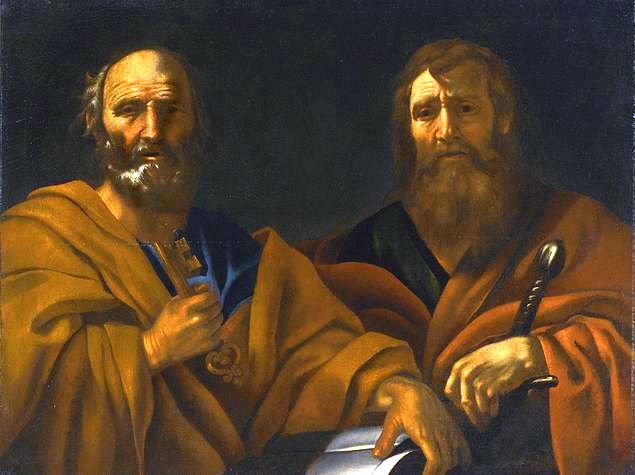|
On Friday, 29th June we celebrated the Solemnity of two great role models for Catholics, Saint Peter, the first Pope (succeeded by our current Pope, Francis) and Saint Paul, Apostle to the Gentiles (i.e. non-Jews). The Church declares this to be a Holy Day of Obligation; we were bound to go to Mass on that day as we are on all Sundays. The word ‘holiday’, (i.e. rest from work) is derived from this term. Centuries ago, Holy Days were the only days off, apart from Sundays, for the poor. Peter and Paul came from relatively ordinary backgrounds. Peter, originally called Simon Bar Jonah (i.e. Son of Jonah), was a fisherman whom Jesus, in recognition of the Pope’s fundamental role of leading the Church and confirming us in the Faith, renamed Peter (Rock, in Latin, Petrus). Initially fearful of those who sought the Death of his Lord and Master and who might well treat His followers in the same way, Peter denied, on the eve of the Passion, even Knowing Jesus! However, on Pentecost Sunday, Confirmed by the Power of the Holy Spirit, Peter would counter a potentially hostile crowd’s mockery, converting three thousand with the Truth! We do not today, generally, risk our lives for correcting error and promoting God’s Laws. Are we prepared, though, to risk our ‘image’ for displaying Moral Courage?!
Paul, previously Saul, was a Pharisee, earning his living as a tent maker. He was firmly convinced that his mission was to stamp out the Christian Faith which was regarded by the Jews as a heresy. His spectacular and sudden conversion (sometimes called his ‘Damascene conversion’), whilst on the road to Damascus to arrest yet more Christians, led to his Baptism as Paul, the fearless Apostle to the Gentiles! We must continually seek his intercession that those who, even today, are convinced that it is their mission to kill ‘in God’s Name’, are brought to discover and accept God’s Truth and turn their zeal to spreading the Gospel of Love. Again, there is so much that our lovingly faithful practice of our Catholic Faith (‘Actions speaking louder that Words’) can do to convert the hearts of those who have been led astray! Both these men, as they made converts and established new Christian communities, wrote follow-up letters (in Latin, 'epistola') to these young cells of the Church over the years, confirming and strengthening them in their Faith and resolving queries or disputes which arose. Saint Peter, charged by Christ with leading the fledgling Church, is credited with two Epistles, while Saint Paul’s writing, as with his missionary travelling, is far more extensive; extracts from his letters feature regularly at Mass. In Peter and Paul’s times, much was passed on by word of mouth as widespread literacy and printing were yet to come. Peter and Paul died Martyrs’ deaths. Peter, like his lord and Master, was crucified; humility moved him to request that he be crucified upside down, as he felt unworthy to die in exactly the same manner as had Jesus. Paul, as a Roman citizen, requested that he be taken to Rome for trial by the Emperor. In agreeing to this request his enemies unwittingly aided his Missionary endeavours. Throughout his lengthy journey to Rome, including being shipwrecked on the Mediterranean island of Malta, Paul seized every opportunity God gave him to evangelise. On reaching Rome, he continued to teach, further spreading the Gospel there, making converts, suffering two terms of imprisonment, and was eventually beheaded during the reign of Nero. As we know, Rome’s central location as what we might, today, term a ‘communications hub’, was to lead to its establishment as the centre of the Catholic world, from where the Head of the Church still governs the now approximately 1.2 billion Catholics around the globe. Just contemplate the wonderful power for Evangelisation by the Church if each and every one of her members actually practises the Faith into which they are baptised! Another of our duties, in Love, is to pray that lapsed (non-practising) Catholics will heed God’s continual Call and return to the Fold! How much do we contribute, through example, to bringing back ‘the lost sheep’? Both Peter and Paul returned that ‘Love unto death’ shown them by Jesus and, in the following centuries, many men and women, drawing courage from their example, would (and, indeed, still do!) lose their freedom and, indeed, their lives on this earth, rather than deny the Truth. Generally speaking, we are probably very unlikely to be asked to make this ultimate Profession of Faith. We may well, however, need to be prepared to face disbelief and even scorn for living as faithful Christians. Are we willing to make the sacrifice, probably not of our life, but of our reputation? Comments are closed.
|
From St. Bart'sThoughts on the traditional teachings, devotions, seasons and matters of the Catholic Church Categories
All
Archives
November 2019
|
Roman Catholic Archdiocese of Southwark
A Registered Incorporated Charity - CIO No. 1173050
A Registered Incorporated Charity - CIO No. 1173050
|
Accessibility - St. Bartholomew's does its utmost to accommodate those with additional needs. Whilst the main body of the church is wholly accessible to people with mobility disabilities, the choir gallery is both approached by stairs and the seating is then stepped by design. The church has a wheelchair-accessible toilet, and baby-changing facilities. There is a Loop System (AFIL) in place in the church.
St. Bartholomew's Catholic Church cannot be held responsible for the content of links to external sites. To contact the church and our priests, click here. For Website-related matters only, click here. |
Website Copyright © St. Bartholomew's Roman Catholic Church and/or the Roman Catholic Archdiocese of Southwark 2016 - 2025


 RSS Feed
RSS Feed
